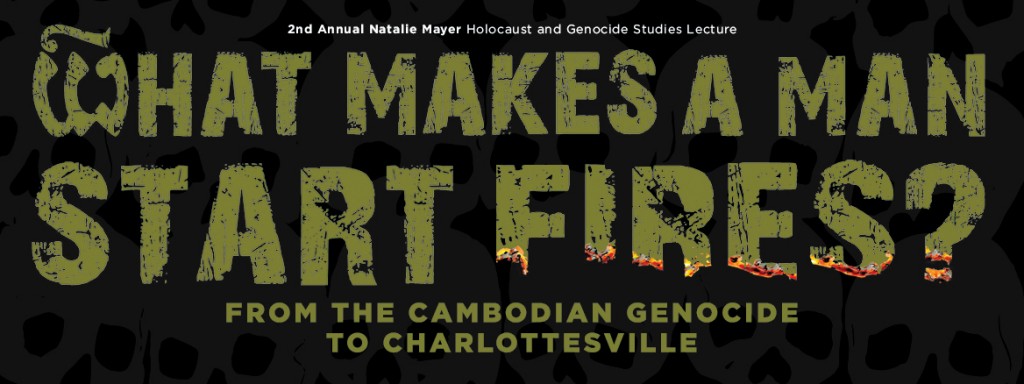The 2019 Natalie Mayer Holocaust and Genocide Studies Lecture

“What Makes a Man Start Fires?”
From the Cambodian Genocide to Charlottesville
Thursday, April 11, at 7 p.m. in the Scandinavian Cultural Center
Speaker: Alexander Hinton, Ph.D., Rutgers University, Newark
Abstract:
“What make a man start fires?” In November 2017, New York Times reporter Richard Faussett asked this question, posed by an album title of the punk band Minutemen, in regard to Tony Hovater — a white nationalist, Nazi sympathizer from Ohio who had participated in Charlottesville. “A Voice of Hate in America’s Heartland,” headlined the title of Faussett’s article about Hovater. Try as he might, Faussett couldn’t find a silver bullet explanation for Hovater’s extremism. He seemed to be an ordinary man, a welder who watched “Seinfeld” and ate at Applebees.
Faussett’s question about the contemporary white nationalism in the U.S. is one that has long been asked in genocide studies and related fields. It is also one Hinton has considered in his work on genocide, including books like Why Did They Kill? Cambodia in the Shadow of Genocide (California 2005) and Man or Monster? The Trial of a Khmer Rouge Executioner (Duke 2016). He also considered this question in March 2016 — as white nationalist discourse was rising in the U.S. during the Presidential election — while participating as an expert witness at the Khmer Rouge tribunal, where Khmer Rouge leaders Nuon Chea and Khieu Samphan were being tried. They would be convicted of genocide and crimes against humanity in late 2018.
Event Details:
- Speaker: Alexander Hinton, Ph.D.
- Time: 7 p.m.
- Date: Thursday, April 11
- Place: Scandinavian Cultural Center
Free and open to the public.
In this talk marking the 40th anniversary of the end of the Cambodian genocide, Hinton considers some of the reasons Khmer Rouge like “Brother Number Two” Nuon Chea “started fires of genocide” before concluding with a discussion of the connections between the Khmer Rouge and contemporary white nationalism in the U.S. In doing so, he contends that, while contextual differences must be acknowledged, there are clearly ways in which the past helps us better understand the present – including offering answers to Faussett’s question about what makes a person “start fires” of genocide and hate in the U.S. today.



Social Media